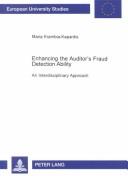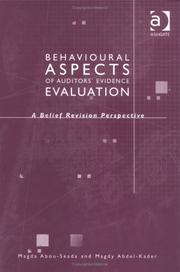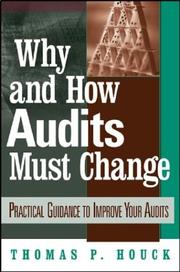| Listing 1 - 10 of 10 |
Sort by
|
Book
ISBN: 0070059128 Year: 1985 Publisher: New York McGraw-Hill
Abstract | Keywords | Export | Availability | Bookmark
 Loading...
Loading...Choose an application
- Reference Manager
- EndNote
- RefWorks (Direct export to RefWorks)
Book
Year: 2022 Publisher: Washington, D.C. : International Monetary Fund,
Abstract | Keywords | Export | Availability | Bookmark
 Loading...
Loading...Choose an application
- Reference Manager
- EndNote
- RefWorks (Direct export to RefWorks)
This report by the external expert panel ("the panel") examines the effectiveness and appropriateness of the safeguards assessments policy in the five years since its last review in 2015. In addition to expressing an opinion on the effectiveness and appropriateness of the safeguards assessment policy, the panel also makes recommendations to the Executive Board for its consideration to improve and optimize the benefits to be garnered from the safeguards assessment policy. The panel's opinion is based on (i) consultations with key stakeholders, including central bank authorities, IMF Executive Directors' offices, and Fund staff; (ii) examination of safeguards assessment and other Fund-specific documents; and (iii) study of international reference materials.
Book
Year: 2022 Publisher: Washington, D.C. : International Monetary Fund,
Abstract | Keywords | Export | Availability | Bookmark
 Loading...
Loading...Choose an application
- Reference Manager
- EndNote
- RefWorks (Direct export to RefWorks)
This paper reviews experience with the safeguards assessment policy since the last review in 2015. The policy is subject to periodic reviews by the Executive Board. The policy's main objective is to mitigate risks of misuse of Fund resources and misreporting of monetary data under Fund arrangements. Consistent with past reviews, an external panel of experts provided an independent perspective on the implementation of the policy.
Book
ISBN: 867892912X 8678929138 Year: 2016 Publisher: Belgrade : Удружење интерних ревизора Србије,
Abstract | Keywords | Export | Availability | Bookmark
 Loading...
Loading...Choose an application
- Reference Manager
- EndNote
- RefWorks (Direct export to RefWorks)
Koncept održivosti poslovanja govori o uspešnosti organizacije da stvara vrednost na dugi rok. U procesu stvaranja vrednosti, pored finansijskih resursa, važno mesto zauzimaju i nefinansijski resursi. Relativni odnos između učinka ove dve vrste resursa menja se i pokazuje tendenciju rasta učinka nefinansijskih resursa. U tom smislu, prirodno se javlja i potreba za nefinansijskim informacijama i izveštavanjem o učincima nefinansijskih resursa. U ovom tekstu razmatraju se kompetencije interne revizije koje mogu da doprinesu kredibilitetu nefinansijskih izveštaja.
Auditing, Analytical review. --- Analytical auditing --- Analytical review auditing --- Auditing

ISBN: 3631369727 0820448079 Year: 2001 Volume: 2727 Publisher: Frankfurt am Main ; New York : Peter Lang,
Abstract | Keywords | Export | Availability | Bookmark
 Loading...
Loading...Choose an application
- Reference Manager
- EndNote
- RefWorks (Direct export to RefWorks)
Auditing, Analytical review. --- Fraud. --- Vérification analytique --- Fraude

ISBN: 0754632210 Year: 2003 Publisher: Aldershot Ashgate
Abstract | Keywords | Export | Availability | Bookmark
 Loading...
Loading...Choose an application
- Reference Manager
- EndNote
- RefWorks (Direct export to RefWorks)
Auditing, Analytical review --- Auditing --- Auditors' reports --- Behaviorism (Psychology) --- Decision making

ISBN: 0471444294 Year: 2003 Publisher: Hoboken, N.J. Wiley
Abstract | Keywords | Export | Availability | Bookmark
 Loading...
Loading...Choose an application
- Reference Manager
- EndNote
- RefWorks (Direct export to RefWorks)
Audit --- Auditing --- Auditing, Analytical review --- audit --- boekhouding, controle --- Analytical auditing --- Analytical review auditing --- Audits --- Financial statements --- Accounting --- Comfort letters
Book
ISBN: 9783658088712 3658088702 9783658088705 3658088710 Year: 2015 Publisher: Wiesbaden : Springer Fachmedien Wiesbaden : Imprint: Springer Gabler,
Abstract | Keywords | Export | Availability | Bookmark
 Loading...
Loading...Choose an application
- Reference Manager
- EndNote
- RefWorks (Direct export to RefWorks)
Kristina Yankova addresses the question of what role professional skepticism plays in the context of cognitive biases (the so-called information order effects) in auditor judgment. Professional skepticism is a fundamental concept in auditing. Despite its immense importance to audit practice and the voluminous literature on this issue, professional skepticism is a topic which still involves more questions than answers. The work provides important theoretical and empirical insights into the behavioral implications of professional skepticism in auditing. Contents Belief Revision and Information Order Effects Professional Skepticism Empirical Analysis Target Groups Researchers and students in the fields of accounting and auditing Practitioners in these areas The Author Dr. Kristina Yankova completed her doctoral studies under the guidance of Prof. Dr. Annette Köhler at the Chair of Accounting and Auditing at the Mercator School of Management, University of Duisburg-Essen.
Economics/Management Science. --- Accounting/Auditing. --- Economics. --- Auditing. --- Economie politique --- Vérification comptable --- Auditors -- Psychology. --- Behaviorism (Psychology). --- Psychology. --- Skepticism. --- Commerce --- Business & Economics --- Accounting --- Auditing, Analytical review. --- Auditing --- Behaviorism (Psychology) --- Human information processing. --- Decision making. --- Scepticism --- Unbelief --- Information processing, Human --- Behavioralism (Psychology) --- Behavioristic psychology --- Behaviouralism (Psychology) --- Behaviourism (Psychology) --- Scientific behaviorism --- Audits --- Financial statements --- Analytical auditing --- Analytical review auditing --- Business. --- Accounting. --- Bookkeeping. --- Business and Management. --- Bionics --- Information theory in psychology --- Perception --- Psychology --- Comfort letters --- Agnosticism --- Belief and doubt --- Free thought --- Accountancy --- Business enterprises --- Commercial accounting --- Finance --- Financial accounting --- Business --- Bookkeeping --- Bookkeeping . --- Double entry bookkeeping --- Business education
Book
ISBN: 9798400228636 Year: 2022 Publisher: Washington, D.C. : International Monetary Fund,
Abstract | Keywords | Export | Availability | Bookmark
 Loading...
Loading...Choose an application
- Reference Manager
- EndNote
- RefWorks (Direct export to RefWorks)
This report by the external expert panel (“the panel”) examines the effectiveness and appropriateness of the safeguards assessments policy in the five years since its last review in 2015. In addition to expressing an opinion on the effectiveness and appropriateness of the safeguards assessment policy, the panel also makes recommendations to the Executive Board for its consideration to improve and optimize the benefits to be garnered from the safeguards assessment policy. The panel’s opinion is based on (i) consultations with key stakeholders, including central bank authorities, IMF Executive Directors’ offices, and Fund staff; (ii) examination of safeguards assessment and other Fund-specific documents; and (iii) study of international reference materials.
Financial institutions. --- Auditing, Analytical review. --- Banking --- Banks and Banking --- Banks and banking --- Central Bank digital currencies --- Central bank governance --- Central Banks and Their Policies --- Central banks --- Communicable diseases --- Covid-19 --- Diseases: Contagious --- Distributed ledgers --- Economics --- Finance: General --- Financial regulation and supervision --- Financial services industry --- Financial services law & regulation --- General Financial Markets: Government Policy and Regulation --- Government and the Monetary System --- Health Behavior --- Health --- Industries: Financial Services --- Infectious & contagious diseases --- Internal controls --- International Financial Reporting Standards --- Monetary economics --- Monetary Policy --- Monetary policy --- Monetary Systems --- Money and Monetary Policy --- Payment Systems --- Political Economy --- Political economy --- Public finance & taxation --- Public Finance --- Regimes --- Revenue administration --- Revenue --- Standards --- State supervision --- Taxation, Subsidies, and Revenue: General --- Technological innovations --- Technology
Book
ISBN: 9798400228742 Year: 2022 Publisher: Washington, D.C. : International Monetary Fund,
Abstract | Keywords | Export | Availability | Bookmark
 Loading...
Loading...Choose an application
- Reference Manager
- EndNote
- RefWorks (Direct export to RefWorks)
This paper reviews experience with the safeguards assessment policy since the last review in 2015. The policy is subject to periodic reviews by the Executive Board. The policy’s main objective is to mitigate risks of misuse of Fund resources and misreporting of monetary data under Fund arrangements. Consistent with past reviews, an external panel of experts provided an independent perspective on the implementation of the policy.
Financial institutions. --- Auditing, Analytical review. --- Auditing / Audits --- Auditing --- Auditing, Internal --- Banking --- Banks and Banking --- Central Bank digital currencies --- Central bank governance --- Central Banks and Their Policies --- Central banks --- Communicable diseases --- Diseases: Contagious --- Distributed ledgers --- Economics --- External audit --- Financial services industry --- Government and the Monetary System --- Health Behavior --- Industries: Financial Services --- Infectious & contagious diseases --- Internal audit --- Monetary economics --- Monetary Policy --- Monetary policy --- Monetary Systems --- Money and Monetary Policy --- Payment Systems --- Political Economy --- Political economy --- Public Administration --- Public finance & taxation --- Public Finance --- Public financial management (PFM) --- Public Sector Accounting and Audits --- Regimes --- Standards --- Technological innovations --- Technology --- Argentina
| Listing 1 - 10 of 10 |
Sort by
|

 Search
Search Feedback
Feedback About UniCat
About UniCat  Help
Help News
News